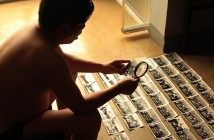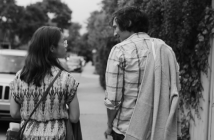Editor’s Note: The Wolfpack opens in limited release this Friday, June 12th.
The Wolfpack grabs your attention right out of the gate. Its premise is the type that leaves you scratching your head in confusion and looking on in wonder. How could you have an apartment in New York City and never venture outside? What could scare a father so much that he would forbid his seven children from ever seeing reality? Why is he OK with the violence and malevolence displayed in film, but not that of reality? Just why? I would love to say that by the time you leave The Wolfpack you have the answers to all of these questions and more. But the world just doesn’t work like that. It’s a lot messier.
So it is all the more impressive that Moselle never feels like a part of the film. She is the camera. She is our portal to this strange world.
Director Crystal Moselle landed on a goldmine when she found the Angulo boys. This tale of solitude and the ultimate escapism through film is beautifully suited to the documentary medium. What better way to tell the story of boys who learned through film but in the medium itself? In whatever way Moselle found to ingratiate herself to the family, it is worth applauding. You cannot just flood the home with cameras and expect the family to continue on as if nothing has changed. In the very making of the film, she is at least introducing one new oddity to this small apartment: herself. So it is all the more impressive that Moselle never feels like a part of the film. She is the camera. She is our portal to this strange world. While she assuredly must have had an effect on how the Angulos lived their life, it is never apparent.
 This is accomplished through the wonderful rapport and trust Moselle has established with the boys. In some way she has convinced them that she is not the enemy and is actually a partner in understanding. The few moments that the boys speak directly to Moselle, it is with friendship and an odd sense of knowing. The film would flop were it not for this trust. It allows the boys, and eventually the mother, to be open and willing to share. For a home constructed on such fear, the lack of it in their communications is quietly impressive.
This is accomplished through the wonderful rapport and trust Moselle has established with the boys. In some way she has convinced them that she is not the enemy and is actually a partner in understanding. The few moments that the boys speak directly to Moselle, it is with friendship and an odd sense of knowing. The film would flop were it not for this trust. It allows the boys, and eventually the mother, to be open and willing to share. For a home constructed on such fear, the lack of it in their communications is quietly impressive.
The first story of a family separated from the world is really only the beginning of The Wolfpack. For once you introduce something new, life can never be the same. There is some intrigue in seeing the boys introduced to the world that they only saw from their window. They are surprisingly self-assured and while they get excited for things like going to a movie theater or stepping into the ocean, the response is oddly muted. The Angulo brothers in the real world are much like all teenagers, self-absorbed, chatty, and just a bit jaded. There is no awe-struck wonder or amazement. In fact, there is very little exploration as to just how this is fundamentally changing them. Certain brothers remain quietly on the outside, lingering on the fringes of the camera, while the more verbose are rather ordinary.
The story of Angulo brothers loses steam as the seal of reality is broken, but the far more interesting story of the parenting that facilitated this strangeness is never even cracked open.
More interesting are the stories left untold. As Moselle has chosen the Angulo brothers to be her subject, the dalliances with the father and mother are left shallow to the detriment of the greater film. While the Angulo brothers are going through their discovery, all the while seemingly abandoning the one major creative outlet that the seclusion afford them, the mother begins to question the choices that she has made. For much of the first half of the film, the parents remain unseen, but as they quietly peek out of their fear-cloaked holes, we are offered a view of something much darker. Notes of mental illness and a strong undercurrent of abuse wind their way through the film. It is unclear if it is a result of non-exploration or if the voices just remained quiet, but these tales go unspoken and the darkness naggingly persistent. The story of Angulo brothers loses steam as the seal of reality is broken, but the far more interesting story of the parenting that facilitated this strangeness is never even cracked open.
In description, The Wolfpack is endlessly captivating. Director Crystal Moselle develops an impressively close relationship with the Angulo brothers and for the first half of the film it is deeply probing. More than just being a story about these brothers, it is about what makes us individuals. Even in solitude the boys have personality and it is an inevitable quest for more that leads them to escape. Unfortunately, after the boys have breached the bounds of the small apartment, the film begins to fall apart. The boys lose some of their individuality, with only a couple truly setting themselves apart from the rest. Additionally, as some set out on important and complex journeys of their own, such as moving out or getting a job, they are shown incomplete and as nearly afterthoughts. Meanwhile, more troubling tales, especially with the boys’ mother, go untold and are little more than hinted at. The Wolfpack is half of a great film. It is able to begin as an explorative and incisive documentary into the unknown, but once the unknown starts to vanish it has trouble determining just what else to say.
The Wolfpack is half of a great film. It is able to begin as an explorative and incisive documentary into the unknown, but once the unknown starts to vanish it has trouble determining just what else to say.



